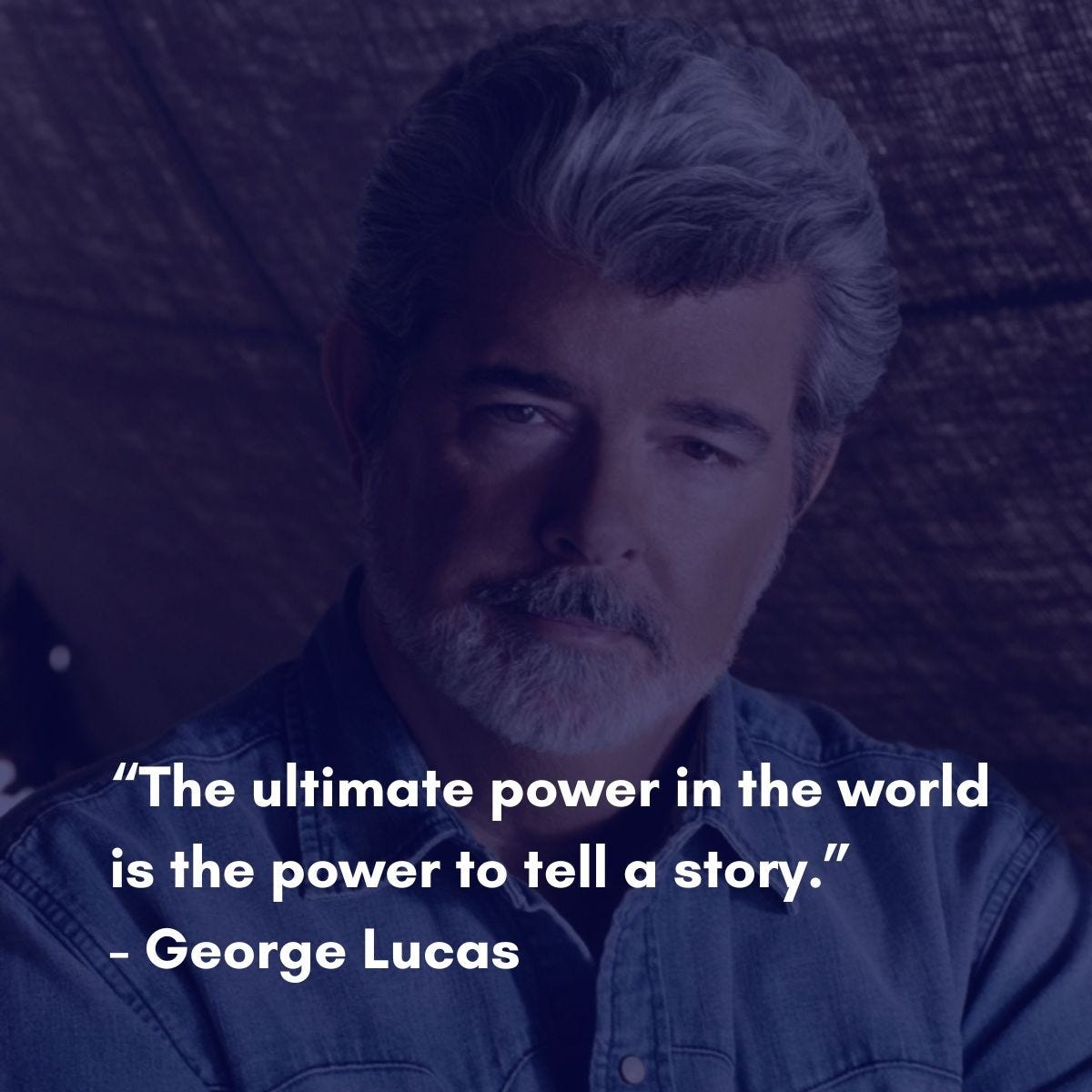3 reasons storytelling is the most important skill (for creators and businesses)
I’ve rarely been what you’d call an “early adopter” of new technology.
But a couple years ago, I my job forced me into becoming one.
Okay, forced might be a little strong. But I had to learn how to use generative AI because the company I worked for started using it for writing all their content.
So, I became an early adopter of ChatGPT, and got pretty good at using it as an asset to boost my productivity. It’s amazing (and a little scary) what generative AI can do. It will inevitably replace some jobs, and this scares many people.
But I think there’s another, more positive consequence people aren’t talking about as much.
Artificial intelligence will put a premium on human creativity.
As the lines between what’s real and what’s not get more blurred, people will long for a human creativity in their media and content. And one creative skill stands out as uniquely human: storytelling.
Here are three reasons the ability to tell a story will be the most important skill of the Twenty-First Century.
1. Stories Shape Your Life and the Culture
I don’t write about politics. But I understand why we have so much polarization right now (here in the US).
Both sides are telling radically different stories.
Each has their own narrative about the way things are, and how things should be in the future. The stories are at odds with each other, so there’s no middle ground.
The side that wins will be the side that convinces the most people to believe their story.

On a smaller scale, I’ve learned the #1 predictor of our happiness and success in life boils down to the stories we tell ourselves about ourselves.
In other words, the role you see yourself playing affects your life depending on whether you’re a:
- Victim
- Overcomer
- Achiever
- Unlucky
All these roles carry stories in them. We say things like, “I’m so unlucky because…” and then we find all the ways we’ve been unlucky in life.
Your mind can’t help listing them off. The more you see, the more reasons you find to support your story.
When you pick a story, you start seeing everything through that lens.
But if you can tell yourself a negative story, you can also tell yourself an empowering story and reap the benefits. If you’re stuck or want to improve your life, tell yourself a better story.
There are many ways you can do this.
I did it by reading biographies of people I admired and taking on their mindsets and positive characteristics. You can also intentionally take actions that you normally wouldn’t take, like starting a business or developing a new (positive) habit. These steps can drastically alter your story and put you in a much better position.
The route you take is unimportant. But when you understand how deeply prevailing narratives affect your life, you can take action to change them.
2. Stories Give You a Sense of Belonging
One day, while sitting in traffic, I noticed a sticker on the car in front of me.
The sticker was a symbol made of three shapes: a straight, vertical line, surrounded by a circle, and enclosed in a triangle.

Some of you will instantly recognize that symbol without explanation. If you don’t know, it’s the symbol of the Deathly Hallows from Harry Potter. The symbol represents the franchise—but it means more than that.
For someone to put that symbol on their car means they have a special connection with the story. They may not be able to put it into words, but that sticker says they’re part of the story. It also helps other Harry Potter fans recognize them and build community.
Sound silly? Not so fast.
You may not have a Harry Potter sticker on your car, but what about:
- A sports logo
- One of those white Apple stickers
- Your alma mater’s name
- A religious symbol
Those are all a type of story—a place to belong.
As Solomon Rushdie says, “We need stories to understand ourselves.”
We also need them to understand our world.
Stories teach us how to live. We unconsciously embody the traits of our favorite characters, or act in accordance with the expectations (i.e. narrative) of our organizations.
I’m convinced so many people feel lost and lonely today because they aren’t part of a bigger story. Does that mean becoming a Harry Potter super-fan will make you happy and fulfilled? Probably not.
But the shared interests can give you a sense of belonging and help raise your self-awareness.
If you’re building a brand or business, you have a unique opportunity to shape your customer’s story. In fact, when you define the role you play in your audience or customer’s life, you other people will join your story.
3. Stories Increase Your Emotional Intelligence
Need to work on your EQ? Read more stories—specifically fiction.
Reading fiction does some pretty neat stuff in your brain, but one of its benefits is it puts you in another person’s shoes. Not only can fiction help sharpen up your empathy skills, but it can also help you develop a better sense of other people’s motivations.
You know that feeling you get when you see a character in a movie you don’t trust? Learning to recognize that from a story can help you learn how to size people up better in life. Kind of like when you meet someone in real life you don’t trust, you get a gut feeling something is off.
Fiction can lead to greater emotional intelligence. After all, great writers are experts at getting you emotional through words.
What do all these famous writers have in common?
- James Patterson
- Steven Pressfiled
- Ernest Hemingway
- Charles Dickens
They all worked in copywriting, advertising, or journalism before they became famous. That’s where they learned how to tell stories that tap into our emotions.
Reading fiction introduces you to wild characters you’d never meet in real life. It often forces your brain to figure out if those characters are good or bad.
Let’s face it, in real life you have to figure out who you can trust and who you can’t and we can all use a little help with reading people.
And no, real people aren’t characters in a novel. But writers are real people whose job is to create convincing characters.
We could all do worse than to learn from them.
The Future Belongs to Storytellers
Whether you’re starting a business, building an audience, or want to build a community, storytelling is a skill you can’t ignore.
Yes, AI may be able to create stories. But it takes a special understanding of human nature to craft narratives that resonate deeply with your intended audience.
It’s time to start using stories to change lives.